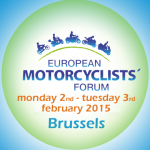 MAG Ireland was at the heart of the debate during two days of presentations and discussions at the European Motorcyclists’ Forum with other motorcycle rider organisations, motorcycle experts, policy-makers and stakeholders in Brussels.
MAG Ireland was at the heart of the debate during two days of presentations and discussions at the European Motorcyclists’ Forum with other motorcycle rider organisations, motorcycle experts, policy-makers and stakeholders in Brussels.
The forum, organised by the Federation of European Motorcyclists’ Associations (FEMA), presented the outcome of the 3 year RIDERSCAN project which was co-funded by the European Commission.
Administered by FEMA, RIDERSCAN brought together a range of stakeholders into an expert group comprising national and EU road safety experts with the aim to gather existing information on motorcycle safety in Europe. This identified needs for action and creates a cross-border knowledge-based network and directly linked to the eight safety areas of the project:
- Infrastructure
- Education/training/testing/licencing
- Data collection/statistics
- Accident reporting
- Research
- Traffic management
- Awareness campaigns
- National strategies
The first day of the forum was held at the CEN-CENELEC Management Centre with the presentation of the outcome of RIDERSCAN – presentations on specific issues such as:
- The Irish Access to PTWs
- Single vehicle accidents of motorcycles in Germany
- Taking into account powered two-wheelers in road infrastructures design in France – FFMC
- The SMC’s Motorcycle Vision Zero – Swedish Motorcyclists Federation (SMC)
- Some insights from the ITF/OECD report” – Improved Safety for Motorcycles, Scooters and Moped”
Day 1 was broken down into five sessions which allowed workshop discussions, with MAG Ireland inputting with the participants.
Inside Parliament
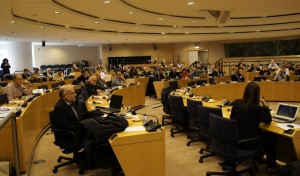
Representing riders at the EU Parliament
The second day of the forum moved into the European Parliament where the RIDERSCAN project was presented again with the addition of the opinions from the first day’s workshop discussions. The question steering the discussion was – How can we tackle motorcycle safety challenges for the next decade?
The parliamentary session apart from being used to obtain views on the outcomes of RIDERSCAN also looked at the mid-term evaluation of the European Commission Road Safety Policy Orientations 2011-2020.
The panel for the session consisted of Szabolcs Schmidt (Head of the Road Safety Unit, Directorate-General for Mobility and Transport (DG MOVE) of the European Commission); members of the European parliament Inés Ayalá-Sender and Wim van de Camp; FIM The Fédération Internationale de Motocyclisme CAP Public Affairs Commission Director Jesper Christenson and FEMA General Secretary Dolf Willigers.
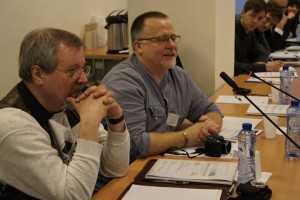
MAG Ireland rep Trevor Baird (right)
At the EMF, Brussels
During the morning in the parliament it became clear that the huge amount of information the RIDERSCAN project has generated will be very useful for the European Commission, and Mr. Schmidt expressed his gratitude for this, saying that the outcomes of the project were very useful and would certainly be taken into account in the mid-tern evaluation of the European Commission Road Safety Policy Orientations 2011-2020.
Mr. Van de Camp and Ms. Ayalá-Sender saw room for improvement of the Road Safety Policy and emphasized the need to use the information of RIDERSCAN in this.
They also foresaw a growing role for powered two wheelers (PTWs) in future mobility.
Mr. Van de Camp then invited the motorcycle community to give him input for the mid-term evaluation of the European Commission Road Safety Policy Orientations 2011-2020 in the European Parliament.
Rider Input
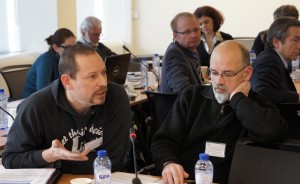
Delegates at the European Motorcyclists’ Forum
Jesper Christensen emphasized the need for better training and licencing; he drew attention to the fact that the present Driving Licence Directive has discriminatory effects on women and smaller men and asked that this issue be addressed. He also asked for better infrastructure and standards for barriers that will take riders into account.
Dolf Willigers stated that the use of powered two wheelers was part of the solution for present and future congestion problems and therefore using a PTW should be made safer. He expressed the hope that the outcomes of the RIDERSCAN project and the willingness of the European Commission to use them would contribute to this.
OECD/ITF Motorcycle Safety Report
Finally Pierre van Elslande, Chairman of the ITF Working Group, presented some of the outcomes of the OECD/ITF – Organisation for Economic Cooperation and Development/International Transport Forum Motorcycle – safety report entitled “The Safety of Powered Two Wheelers”.
The objectives of the report are to:
- Review the latest research works in the field of motorcycling safety
- Better understand road crash mechanisms and configurations
- Evaluate most effective measures in the framework of a “safe system” approach
- Make recommendations to decision makers in OECD/ITF countries – countries from around the world
In his presentation regarding a growing role of PTWs in global mobility, Mr. Van Elslande referred a disproportional number of casualties of riders and the need to take action on this.
The OECD/ITF report will contain recommendations to enhance motorcycle road safety and FEMA/FIM/FIM Europe have put together a combined response to the draft version of this report.
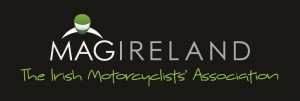
MAG Ireland
MAG Ireland was represented at the European Motorcyclists’ by representative Trevor Baird who has the unenviable task of sorting through the complex issues of European issues of technical, political and representation to the legislators, other motorcycle rider organisations, motorcycle experts and stakeholders in Brussels.
However in simple terms that means letting riders continue to ride and enjoy motorcycling – the hard work to let you throw a leg over your bike and ride!.
If there are any issues that you need clarifying or just want to understand you can contact Trevor via email – Click Here
Links Information
RIDERSCAN presentation – pdf – Click Here
RIDERSCAN – www.riderscan.eu
European Motorcyclists Forum – On Facebook
Presentations and pictures from the Forum – Click Here
Pictures from the Parliamentary session – Click Here
Towards a European road safety area ON THE MOVE for safer roads in Europe policy orientations on road safety 2011-2020 – pdf – Click Here